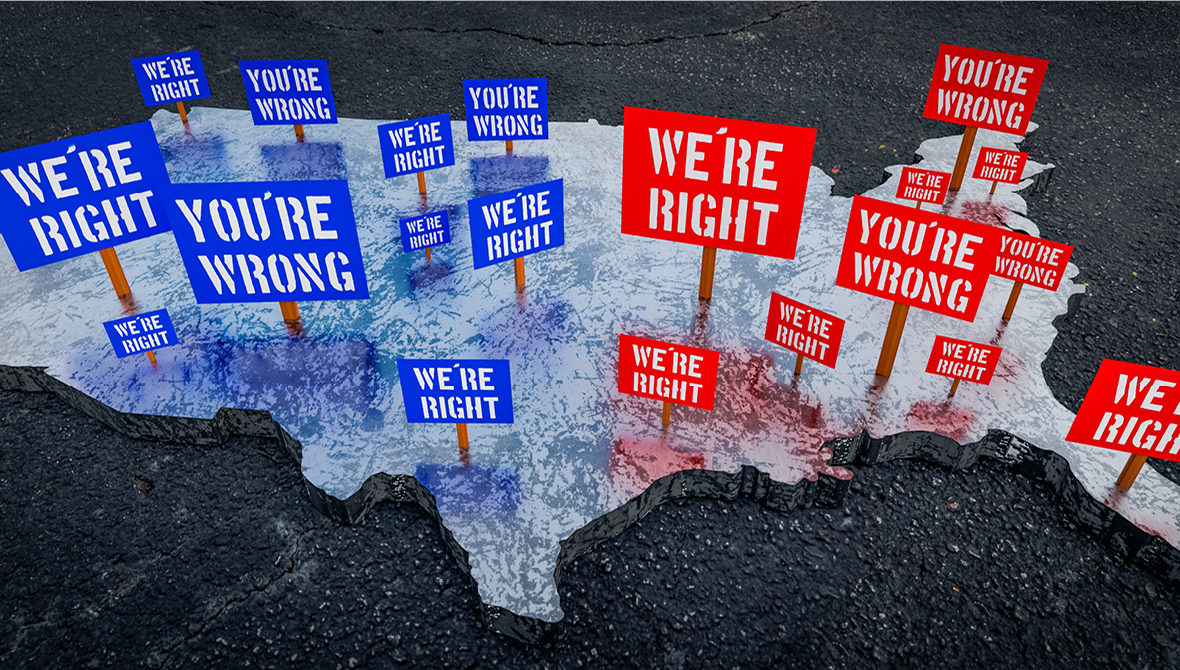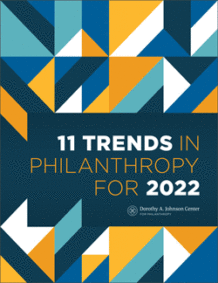Philanthropy is Increasingly Embroiled in the Culture Wars


 This article was first published in our 11 Trends in Philanthropy for 2022 report. Explore all 11 trends in the full report.
This article was first published in our 11 Trends in Philanthropy for 2022 report. Explore all 11 trends in the full report.The daily news is replete with stories about the increasing polarization in our society. Many issues we once thought of as common ground, such as public health, have become battlegrounds instead. Perhaps we should be unsurprised then, to see that philanthropy is becoming increasingly enmeshed in these larger culture wars.
The “culture wars” concept was popularized by sociologist James Davison Hunter in his 1991 book, Culture Wars: The Struggle to Define America. In it, he argues that the ideological battle he saw happening then between secular progressives and religious conservatives represented a schism in values and the broader sense of a shared U.S. identity wider than anything since the Civil War.
Since Hunter’s initial publication, some public figures have embraced the language of war, as these broad ideological differences play out across a variety of issues, and promote a win/lose mentality that undermines any belief in or serious efforts to reach compromise.
“In the U.S., three issues in particular have drawn philanthropy deeper into this polarization: racial justice, voting rights and civic engagement, and abortion rights.”
Today, those contested core values — privacy, property rights, human rights, religious freedom — continue to come into conflict with each other in ways that are not easy to resolve. Voices from across philanthropy are now picking up the language of “culture wars” to describe how those same conflicts show up in our work and conversations.
The Heritage Foundation offers nearly two dozen articles in their digital “Culture Wars” collection (2020). In August 2021, Inside Philanthropy asked “Where is Philanthropy?” in the nationwide debate on critical race theory (Matthiessen). Internationally, in the United Kingdom, commentators in the media debated whether the Ministry of Digital, Culture, Media and Skills, which oversees policy related to charities, is being turned into the “Ministry of Culture Wars” (Kennedy, 2021).
Nonprofit advocacy groups on both sides, with support from individual donors and foundations, have been escalating the rhetoric and working to influence policy at all levels to align with their beliefs and values. In the U.S., three issues in particular have drawn philanthropy deeper into this polarization: racial justice, voting rights and civic engagement, and abortion rights.
On the racial justice front, organizations like the Ford Foundation and the W.K. Kellogg Foundation have clearly staked out their positions. The Ford Foundation (2021) notes that they focus on “Disrupting systems to advance social justice” (para. 4), while the W.K. Kellogg Foundation identifies a commitment to advancing racial equity and racial healing as part of their DNA.
At local levels, community foundations are also committing to racial justice work. The Brooklyn Community Foundation, for example, states that racial justice is core to their mission of building a more fair and just Brooklyn, and they define racial justice as “the systemic redistribution of power, opportunities, and access for people of all races” (para. 3). Some foundations, as we noted in last year’s Trends report, have begun to focus on reparations, particularly for Native American and Black communities (Olivarez & Starsoneck, 2020).
On the other hand, under the leadership of Elise Westhoff, the Philanthropy Roundtable is strongly arguing against philanthropy’s focus on racial justice (Rendon, 2021) and launched a new campaign, True Diversity, that seeks to move the conversation away from race.
Education — long the recipient of philanthropic dollars — has come under fire for accusations of brainwashing students by teaching critical race theory (Anderson, 2021). A recent guest blog post on the Philanthropy Roundtable website encouraged philanthropists to support challenges to schools’ diversity, equity, and inclusion campaigns (Hermann, 2021).
While philanthropy has a long history of supporting civic engagement and voting rights (see, for example, the MacArthur Foundation’s work), the aftermath of the 2020 elections elevated the voting rights vs. integrity of voting conflict in the sector. Despite the lack of evidence of widespread election fraud (Waldman, 2021), eighteen states have enacted legislation to restrict voting (Schouten, 2021) by making identification requirements more stringent (see the Georgie Secretary of State’s website, for example, and the National Conference of State Legislatures for a state-by-state list of identification laws) and to limit the options for mail-in and extended voting options (Texas, for example — see Brander, 2021).
Nonprofit organizations, foundations, and individual donors are stepping up on this issue in various ways. The Election Integrity Foundation received 501(c)(3) status in February 2020; their mission:
… to create voting villages and other platforms with the purpose of teaching election security and cyber security, providing resources when needed to validate the process surrounding elections, and working to ensure better election platforms are developed for the future to provide the best integrity of the voting process. (para. 3)
This might be viewed as a concerted effort to restrict access to voting in the name of security. The Carnegie Corporation, on the other hand, has continued to ramp up its support of civic engagement, including urging other funders to support advocacy, organizing, and litigation to protect voting rights (Daniels, 2019).
As this is being written, the U.S. Supreme Court has just heard oral arguments on a case that may alter the right to abortion afforded under Roe v. Wade. In the years since that decision, funders and nonprofits have lined up on both sides. Many of the organizations that offer reproductive health services are themselves part of the vast nonprofit health sector.
Yet, as the makeup of the Supreme Court has changed and more states have begun challenging the decision through new legislation that imposes restrictions, attention is ramping up.
The National Network of Abortion Funds has increased its fundraising and communications efforts in light of Texas’ S.B. 8, which effectively outlaws abortions after six weeks and created an expansive “citizen enforcement” program (2021). In the meantime, anti-abortion activism has continued to grow; Inside Philanthropy recently documented the funders and nonprofits with an anti-abortion agenda. As they note, this work is often part of a larger conservative ideology (Travers, 2020).
“[I]t is not all surprising that definitions of what is public good differ across the sector. It is the flexibility to focus resources on issues that are important to society that gives philanthropy its power.”
We can see this widening schism across a variety of other issues, ranging from gun control to LGBTQ+ rights, and climate change. When we think of philanthropy as private action for the public good (Payton & Moody, 2008), it is not all surprising that definitions of what is public good differ across the sector. It is the flexibility to focus resources on issues that are important to society that gives philanthropy its power.
There is a danger that, as political power shifts across parties, the party in power will seek to restrict giving in ways that will support their ideological stance and damage the credibility of the philanthropic sector as a whole. For example, over the years there have been accusations that the tax-exempt applications of nonprofits that lean one way or the other have been given extra scrutiny by the IRS (Sekulow, 2017). Others have argued that there’s no evidence of this happening (Hackney, 2018).
While philanthropy is part of our culture — and therefore perhaps inevitably part of the culture wars — those who care about it need to be vigilant that it not become a war victim by coming to be seen as a weapon, rather than a tool for the common good.
Anderson, B. (2021, November 4). Critical race theory is a flashpoint for conservatives, but what does it mean? PBS News Hour. https://www.pbs.org/newshour/education/so-much-buzz-but-what-is-critical-race-theory
Bradner, E. (2021, September 8). The new Texas voting law includes these 7 major changes. CNN. https://www.cnn.com/2021/09/07/politics/what-texas-voting-bill-doesdex.html/in
Brooklyn Community Foundation. (n.d.) Our racial justice lens. https://www.brooklyncommunityfoundation.org/about/our-racial-justice-lens
Daniels, A. (2019, November 4). Carnegie Corporation urges fellow grant makers to support voting rights. Chronicle of Philanthropy. https://www.philanthropy.com/article/carnegie-corporation-urges-fellow-grant-makers-to-support-voting-rights/
Election Integrity Foundation. (2021). Mission. https://electionintegrityfoundation.org/#mission
Ford Foundation. (2021). Justice begins where inequality ends. https://www.fordfoundation.org
Georgia Secretary of State. (2021). Georgia voter identification requirements. https://sos.ga.gov/index.php/elections/georgia_voter_identification_requirements2
Hackney, P. (2018, April 15). The real IRS scandal has more to do with budget cuts than bias. The Conversation. https://theconversation.com/the-real-irs-scandal-has-more-to-do-with-budget-cuts-than-bias-95026
Heritage Foundation. (2020) Culture wars. https://www.heritage.org/culture-wars
Hermann, K. (2021, August 3). Landmark lawsuit challenges race-based programming in schools. https://www.philanthropyroundtable.org/home/blog/post/roundtable/2021/08/03/landmark-lawsuit-challenges-race-based-programming-in-schools
Hunter, J. D. (1991). Culture wars: The struggle to define America. BasicBooks.
Kennedy, J. (2021, September 16). A department for culture wars will not help charities or the country. Directory of Social Change. https://www.dsc.org.uk/content/a-department-for-culture-wars-will-not-help-charities-or-the-country/
MacArthur Foundation. (2021). Strengthening American democracy. https://www.macfound.org/programs/democracy/
Matthiessen, C. (2021, August 26). As conservatives stoke the critical race theory culture wars, where is philanthropy? Inside Philanthropy. https://www.insidephilanthropy.com/home/2021/8/26/as-conservatives-stoke-the-critical-race-theory-culture-wars-where-is-philanthropy
National Conference of State Legislatures. (2021). Voter ID laws. https://www.ncsl.org/research/elections-and-campaigns/voter-id.aspx#Details
National Network of Abortion Funds. (2021). Texas abortion funds bring show of power as six-week ban faces challenges at Supreme Court. https://abortionfunds.org/tx-funds-show-of-power/
Olivarez, J., & Starsoneck, L. (2020). Philanthropy and reparations: Righting the past. 11 trends in philanthropy for 2020. Dorothy A. Johnson Center for Philanthropy. https://johnsoncenter.org/blog/philanthropy-and-reparations-righting-the-past/
Payton, R. L., & Moody, M. P. (2008, March 26). Understanding Philanthropy. Indiana University Press.
Philanthropy Roundtable. (2021). True diversity. https://www.true-diversity.com
Rendon, J. (2021, September 8). The Philanthropy Roundtable’s CEO opposes ‘Woke Philanthropy’, prompting some grant makers to feel and others to give more. Chronicle of Philanthropy, 33(11). https://www.philanthropy.com/article/the-philanthropy-roundtables-ceo-opposes-woke-philanthropy-prompting-some-grant-makes-to-flee-and-others-to-give-more
Schouten, F, (2021, July 22). Eighteen states have enacted new laws that make it harder to vote. CNN. https://www.cnn.com/2021/07/22/politics/voting-restrictions-state-laws/index.html
Sekulow, J. (2017, April 17). Lois Learner got off easy in the IRS scandal. It’s time to reexamine the targeting of conservatives. Fox News. https://www.foxnews.com/opinion/lois-lerner-got-off-easy-in-the-irs-scandal-its-time-to-reexamine-the-targeting-of-conservatives
Texas Legislature Online. (2021) Bill: SB 8. https://capitol.texas.gov/BillLookup/Text.aspx?LegSess=87R&Bill=SB8
Travers, J. (2020, April 8). Abortion foes are scoring more winds. Here’s who is funding a powerful movement. Inside Philanthropy. https://www.insidephilanthropy.com/home/2020/4/8/abortion-foes-are-scoring-more-wins-heres-who-is-funding-a-powerful-movement
W.K. Kellogg Foundation. (n.d.). Priorities. https://www.wkkf.org/what-we-do/overview
Waldman, M. (2021, December 14). The big lie and state courts. Brennan Center for Justice. https://www.brennancenter.org/our-work/analysis-opinion/big-lie-and-state-courts